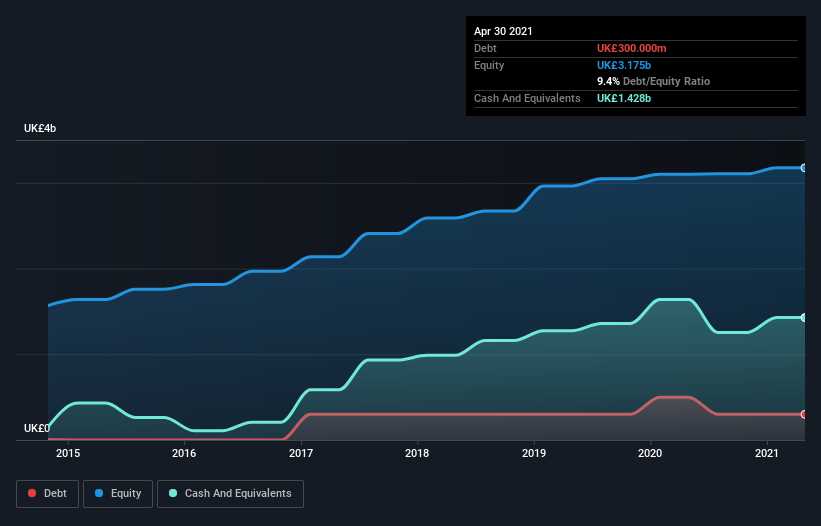- United Kingdom
- /
- Consumer Durables
- /
- LSE:BKG
Here's Why Berkeley Group Holdings (LON:BKG) Can Manage Its Debt Responsibly
Some say volatility, rather than debt, is the best way to think about risk as an investor, but Warren Buffett famously said that 'Volatility is far from synonymous with risk.' So it seems the smart money knows that debt - which is usually involved in bankruptcies - is a very important factor, when you assess how risky a company is. Importantly, The Berkeley Group Holdings plc (LON:BKG) does carry debt. But should shareholders be worried about its use of debt?
Why Does Debt Bring Risk?
Generally speaking, debt only becomes a real problem when a company can't easily pay it off, either by raising capital or with its own cash flow. Ultimately, if the company can't fulfill its legal obligations to repay debt, shareholders could walk away with nothing. However, a more common (but still painful) scenario is that it has to raise new equity capital at a low price, thus permanently diluting shareholders. Of course, plenty of companies use debt to fund growth, without any negative consequences. When we think about a company's use of debt, we first look at cash and debt together.
See our latest analysis for Berkeley Group Holdings
How Much Debt Does Berkeley Group Holdings Carry?
You can click the graphic below for the historical numbers, but it shows that Berkeley Group Holdings had UK£300.0m of debt in April 2021, down from UK£500.0m, one year before. But it also has UK£1.43b in cash to offset that, meaning it has UK£1.13b net cash.

How Healthy Is Berkeley Group Holdings' Balance Sheet?
The latest balance sheet data shows that Berkeley Group Holdings had liabilities of UK£1.68b due within a year, and liabilities of UK£694.8m falling due after that. Offsetting these obligations, it had cash of UK£1.43b as well as receivables valued at UK£75.9m due within 12 months. So its liabilities total UK£872.7m more than the combination of its cash and short-term receivables.
Of course, Berkeley Group Holdings has a market capitalization of UK£4.79b, so these liabilities are probably manageable. Having said that, it's clear that we should continue to monitor its balance sheet, lest it change for the worse. While it does have liabilities worth noting, Berkeley Group Holdings also has more cash than debt, so we're pretty confident it can manage its debt safely.
Fortunately, Berkeley Group Holdings grew its EBIT by 6.9% in the last year, making that debt load look even more manageable. There's no doubt that we learn most about debt from the balance sheet. But ultimately the future profitability of the business will decide if Berkeley Group Holdings can strengthen its balance sheet over time. So if you're focused on the future you can check out this free report showing analyst profit forecasts.
Finally, while the tax-man may adore accounting profits, lenders only accept cold hard cash. Berkeley Group Holdings may have net cash on the balance sheet, but it is still interesting to look at how well the business converts its earnings before interest and tax (EBIT) to free cash flow, because that will influence both its need for, and its capacity to manage debt. During the last three years, Berkeley Group Holdings produced sturdy free cash flow equating to 70% of its EBIT, about what we'd expect. This free cash flow puts the company in a good position to pay down debt, when appropriate.
Summing up
Although Berkeley Group Holdings's balance sheet isn't particularly strong, due to the total liabilities, it is clearly positive to see that it has net cash of UK£1.13b. And it impressed us with free cash flow of UK£322m, being 70% of its EBIT. So is Berkeley Group Holdings's debt a risk? It doesn't seem so to us. Of course, we wouldn't say no to the extra confidence that we'd gain if we knew that Berkeley Group Holdings insiders have been buying shares: if you're on the same wavelength, you can find out if insiders are buying by clicking this link.
When all is said and done, sometimes its easier to focus on companies that don't even need debt. Readers can access a list of growth stocks with zero net debt 100% free, right now.
Valuation is complex, but we're here to simplify it.
Discover if Berkeley Group Holdings might be undervalued or overvalued with our detailed analysis, featuring fair value estimates, potential risks, dividends, insider trades, and its financial condition.
Access Free AnalysisThis article by Simply Wall St is general in nature. We provide commentary based on historical data and analyst forecasts only using an unbiased methodology and our articles are not intended to be financial advice. It does not constitute a recommendation to buy or sell any stock, and does not take account of your objectives, or your financial situation. We aim to bring you long-term focused analysis driven by fundamental data. Note that our analysis may not factor in the latest price-sensitive company announcements or qualitative material. Simply Wall St has no position in any stocks mentioned.
Have feedback on this article? Concerned about the content? Get in touch with us directly. Alternatively, email editorial-team (at) simplywallst.com.
About LSE:BKG
Berkeley Group Holdings
The Berkeley Group Holdings plc, together with its subsidiaries, builds homes and neighbourhoods in the United Kingdom.
Excellent balance sheet and fair value.
Similar Companies
Market Insights
Community Narratives



